They’re Black Democrats. And They’re Suing Chicago Over Migrants. The city greets new arrivals with resources like health screenings and rent support. ‘They’re giving migrants all the things we’ve been asking for since we came here in chains.’ By Olivia Reingold
“How dare you?”
That was the first reaction Cata Truss, a 57-year-old mother on the West Side of Chicago, had when she found out who was behind the push to turn her neighborhood park into a shelter for migrants: Democrats she helped elect.
“All these people, I have supported every one of them,” she says about Mayor Brandon Johnson and his progressive allies. “I was like, ‘Are you freaking kidding me?’ ”
There was no way she was going to let Amundsen Park—what she calls “the crown jewel of the community”—go to the newly arrived migrants from the Mexican border. Especially not when there were black Chicagoans who needed the space, which she says kept her five sons “out of trouble” and busy playing football when they were young.
“There’s a humanitarian crisis in the black community,” said Truss. “But every time we have a need in our community, we’re told that there are no funds. There’s no money for us.”
Truss and other black residents told me that Chicago, which calls itself a “welcoming city,” has been very welcoming—just not to them. Since August 2022, Chicago has greeted nearly 35,000 new arrivals with resources like laundry services, mental health screenings, and $15,000 in rental support per person—all funds that Truss says could’ve gone a long way in Amundsen Park in Chicago’s Austin neighborhood, where nearly 28 percent of residents live below the poverty line.
So last October, a day before the field house was set to become a migrant shelter, Truss raced to the local courthouse, along with three of her neighbors—plus the head of the local NAACP chapter for moral support. For the next two and a half hours, she drafted a lawsuit in a notebook, then ripped out the pages and handed them to a clerk. Her argument, handwritten in pen, was that the field house was “designated for recreational use within the community,” not housing noncitizens. One of her co-plaintiffs, Gerald K. Harris, runs the football program at the field house that trained her five sons.
“I was like, ‘bring it on,’ ” she says. “Let’s fight.”
The city of Chicago is now facing seven lawsuits, at least three of them filed by people of color, all bound by a concern that their leaders would rather serve the migrants than their own vulnerable citizens. Truss is now represented by Deidre Baumann, a Democratic civil rights attorney working on a pro bono basis, along with her four co-plaintiffs, all of whom are black. A second suit, in the South Side, has two black plaintiffs. A third, in Chicago’s Brighton Park, is led by five Hispanic residents and one Asian American.
Although critics often claim that only “extreme MAGA Republicans” oppose the record influx of migrants into the U.S., if you visit Chicago like I did earlier this month, you’ll see that these plaintiffs are not motivated by bigotry. Instead, most of them are minorities who feel their communities are getting the short end of the stick.
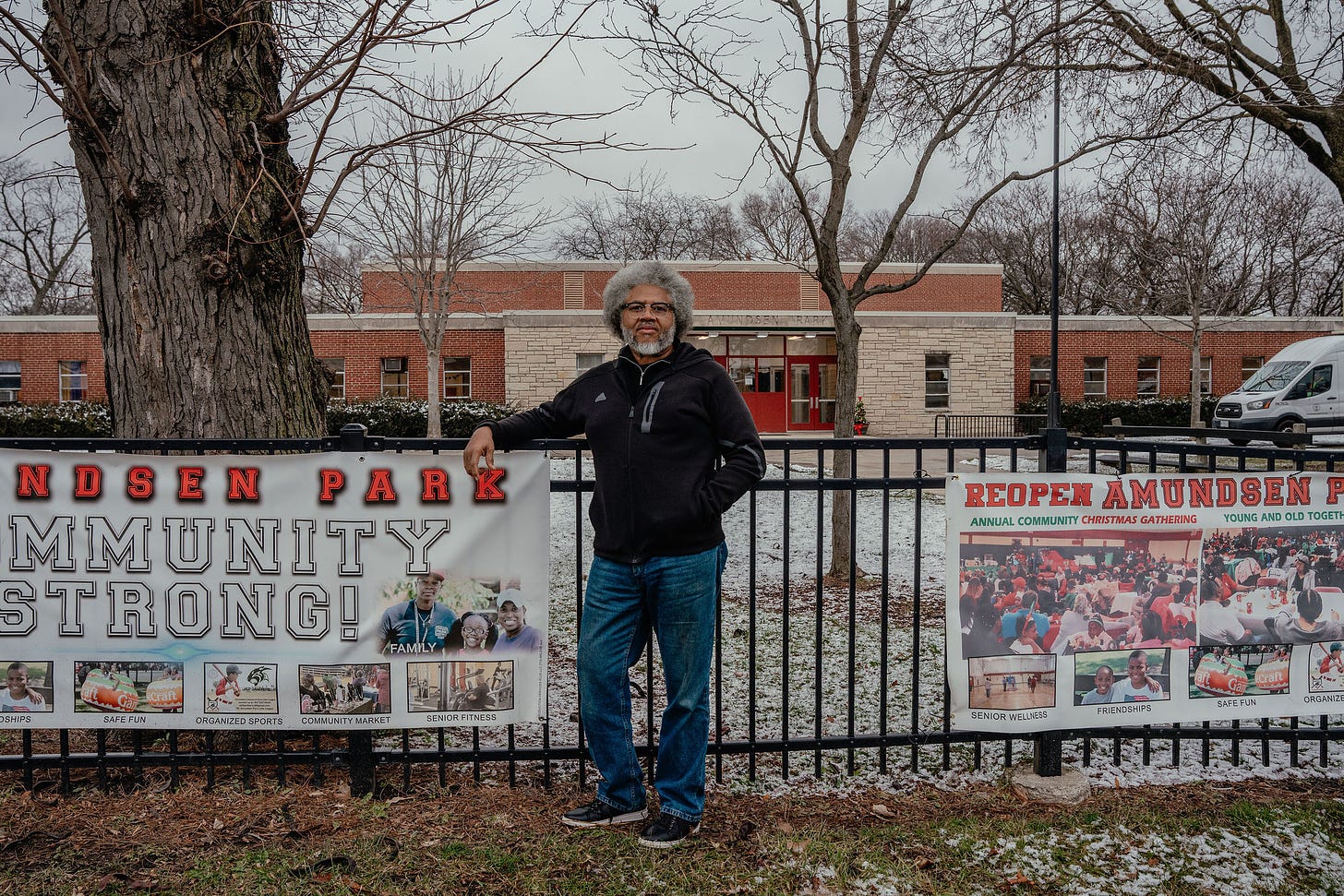
This anger is especially mounting in Chicago’s black neighborhoods. In churches and community centers, locals have been booing city officials and grabbing their microphones mid-speech. Protesters have guarded their community centers overnight, in one instance chanting “hell no, we won’t go.”
The crisis is leading many Democrats to turn on their own party. I spoke with 18 Democrats in Chicago, including a restorative justice advocate, a former Obama intern, and an exonerated felon, who all told me they’re considering sitting out the election this year rather than vote for President Joe Biden. A couple said they’re even thinking of voting for Donald Trump. It’s a phenomenon that’s being reflected in national polls, with Trump on track to win nearly a quarter of the black vote in key battleground states. That means that a fifth of black voters, who voted for Biden by a margin of 92 percent in 2020, could turn their back on the president.
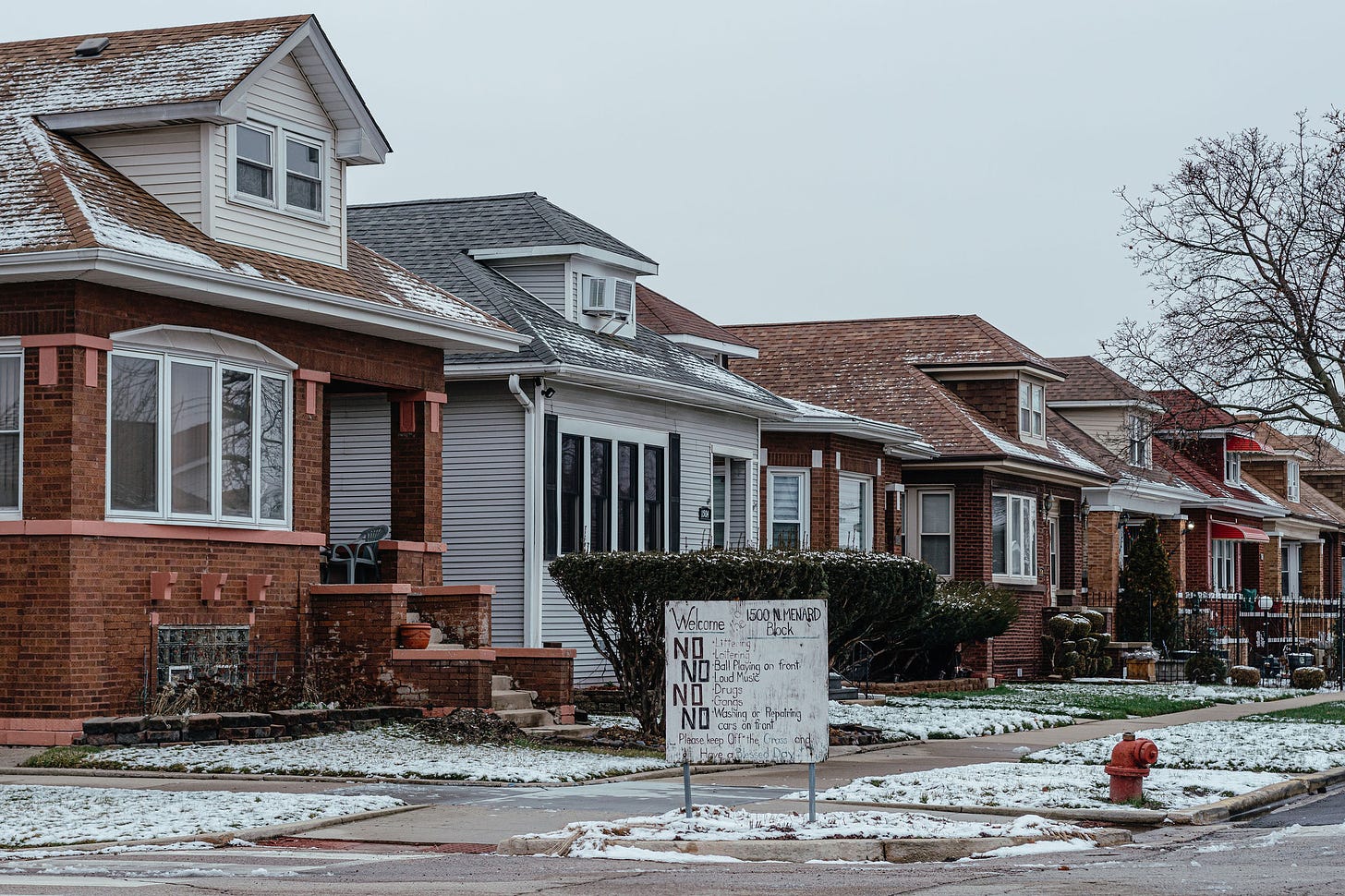
J. Darnell Jones is another plaintiff suing the city. He puts his position on immigration bluntly, stating: “They’re giving the migrants all the things we’ve been asking for since we came here in chains.”
Jones, who lives on the South Side of Chicago, is a DEI consultant and proponent of reparations. In 2018, he even ran as a Democrat for a U.S. House seat in Texas. And yet, he can’t help but place the blame on the Democrats for what’s unfolding in his city.
“What the Democratic Party doesn’t want black people to hear is that this is a Biden policy,” says Jones, 52. “Biden is allowing the borders to remain open.”
In May, the crisis hit his corner of South Shore, where 94 percent of his neighbors are black. That’s when the city announced that an abandoned high school would not become a community center like his neighbors had long been pushing for. Instead, it would become the city’s latest migrant shelter.
Jones and I are seated in my rental car, staring up at the large, brick building that led him to file a lawsuit against the city with his neighbor, Natasha Dunn, an education activist for black students in Chicago public schools. Their argument? A public building cannot be used to serve noncitizens.
“There was just this level of disgust,” Jones tells me. “The community has wanted this building back for so long, and now you want to use it in this way that would be harmful? There was no way we were going to stand for that.”
But what irked him most was that it was his own party behind this.
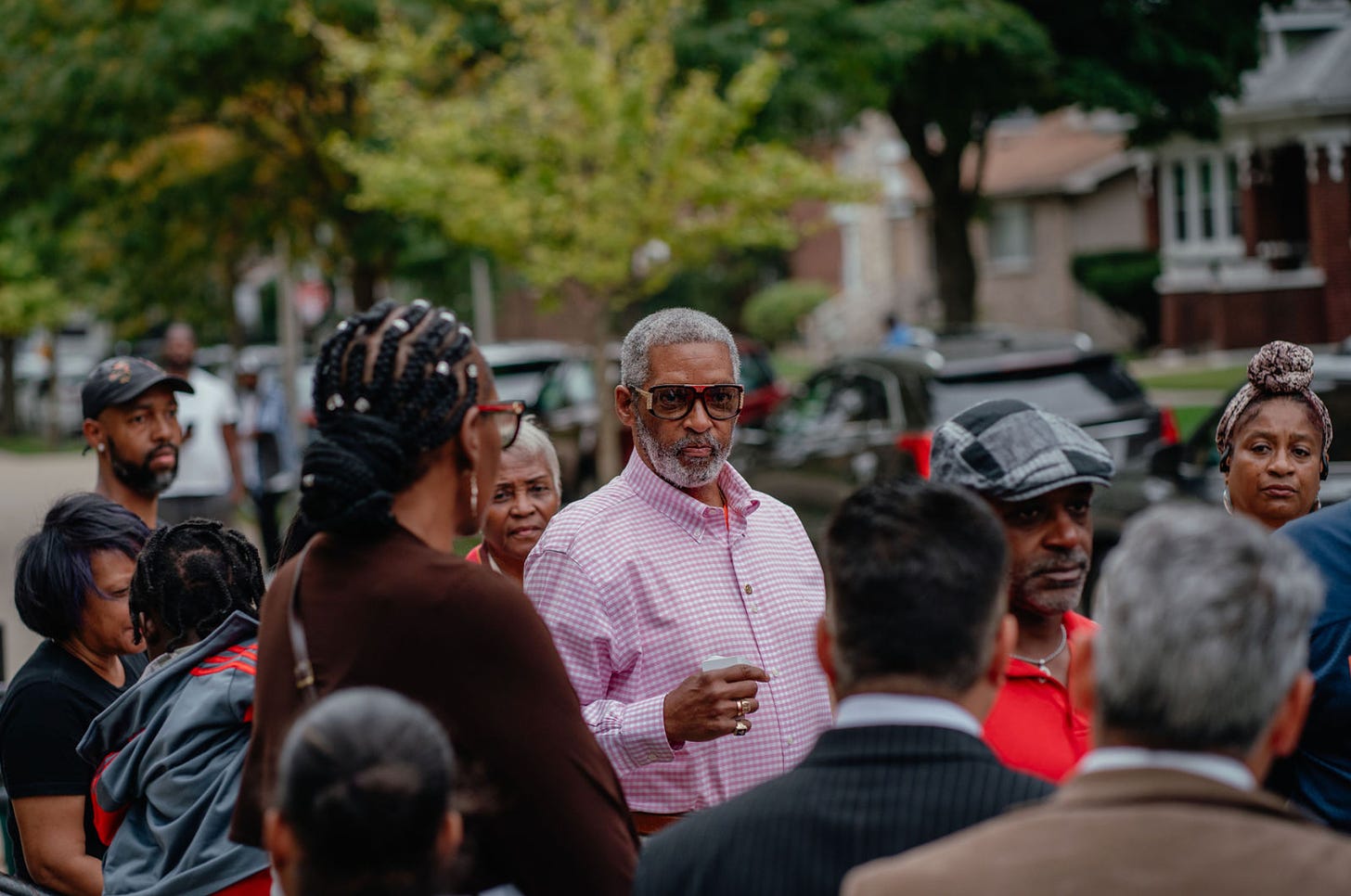
“They say it’s Abbott,” Jones says, referring to Texas governor Greg Abbott, who has been busing migrants who cross the U.S.–Mexico border from his state to sanctuary cities like Chicago and New York. “But these migrants couldn’t even be getting through if it weren’t for Biden.”
Polling shows that an increasing number of Americans agree: 68 percent of voters polled disapprove of the president’s handling of the U.S.–Mexico border. And less than a quarter say the recent influx of migrants would make American society “better in the long run.”

Chicago isn’t just facing lawsuits—it’s grappling with a growing movement of civil disobedience, led by black Democrats who feel betrayed by their party.
Andre Smith is one of them.
Smith, a pro-reparations Democrat running for the Illinois House of Representatives, lives across the street from two shuttered public schools in Washington Park, another South Side neighborhood where nearly 94 percent of residents are black.
We’re seated on his leather couch in his two-story brick home.
“My mom taught me about helping people that need help,” says Smith, a 55-year-old minister. “But in the city of Chicago, we were always told there wasn’t any funding for the African American communities.”
With his hands clasped in his lap, he tells me that he’s heard of students on the South Side having to share textbooks. Kids around here, he says, were some of the last to get laptops. And in 2013, under Mayor Rahm Emanuel, a Democrat, the city shuttered 50 schools—many of them in majority-black neighborhoods—including the former elementary school across the street.
He leans toward the window to pluck the blinds apart. Across the street, there’s a royal blue sign that once welcomed students with messages like “Welcome to Betsy Ross: Believing Excellence Is Attainable.”
Now, the windows are boarded up with plywood—and Smith says that local kids have to walk farther to get to school, often veering into gang territory.
“I’ve been looking at these closed schools over and over again, that our children once went to, and that were closed due to a lack of funding. Now migrants are residing in those schools. It’s heartbreaking.”
He looks me dead in the eye. “That’s when I realized I was prepared to go to jail for this.”
Last February, Smith was arrested, along with two other black men, for trying to block a bus from dropping off migrants at Wadsworth Elementary School, which has sat idle since its closure in 2013.
“All of my life, I have seen rejection for the black community,” says Smith, who grew up in the Robert Taylor Homes, a now-demolished housing project. “I’ve seen the worst of the worst. I’ve seen people not come and help us. I’ve seen violence. And at this point, I was tired. I was fed up with our leadership not standing up in our community for what’s right.”
The bus, he says, came to a screeching halt only two feet away from him. He says he could see police closing in on him from the sidewalk.
“I was afraid—afraid of how the police treats black people,” he says. “But I was not going to let them welcome the migrants into a place that they rejected our kids from.”
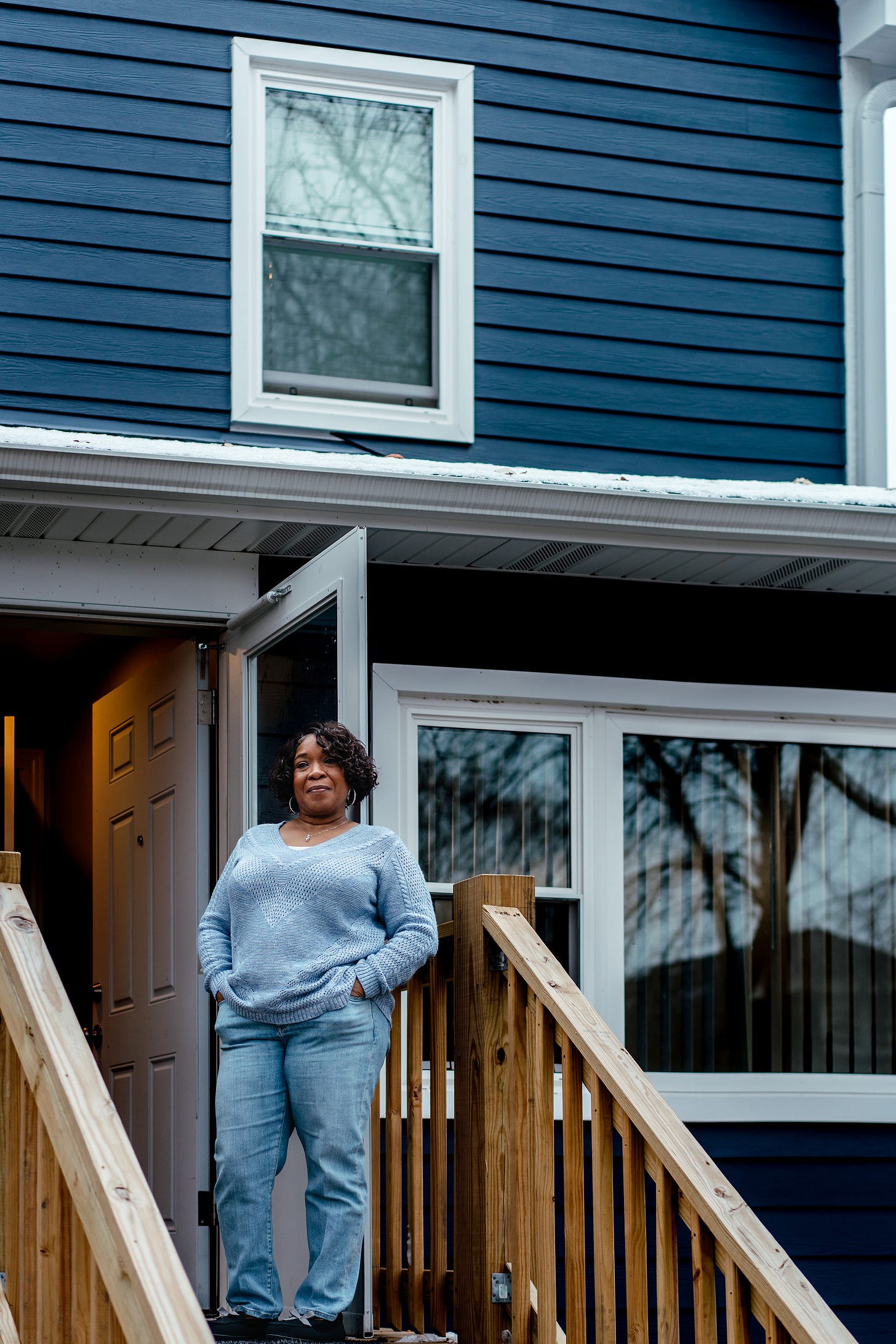
Now, Wadsworth Elementary School, one of 28 city-run migrant shelters, is home to an estimated 600 adults. Few neighborhoods are spared from the burden of housing the migrants—one shelter is even based out of a beachfront hotel with a view of Lake Michigan. But black Chicagoans tell me it stings more when the city revives schools, health clinics, and park buildings for outsiders that it had left closed or neglected for them.
While Smith still identifies as a Democrat, he says many in his community do not.
“A lot of them are hurt. They are mad—they’re angry. And some of them are saying that they’re going to sit it out this election.”
To regain their trust, he says, the party needs to return to its working-class roots. U.S. support for immigration has been falling over the past decade, reaching a low of 28 percent last year, yet the most recent Democratic Party platform pledged to “expand the existing asylum system and other humanitarian protections.”
“I want to turn the party back to a fair party, a party for everyone,” he says. “Not a party for the elites.”
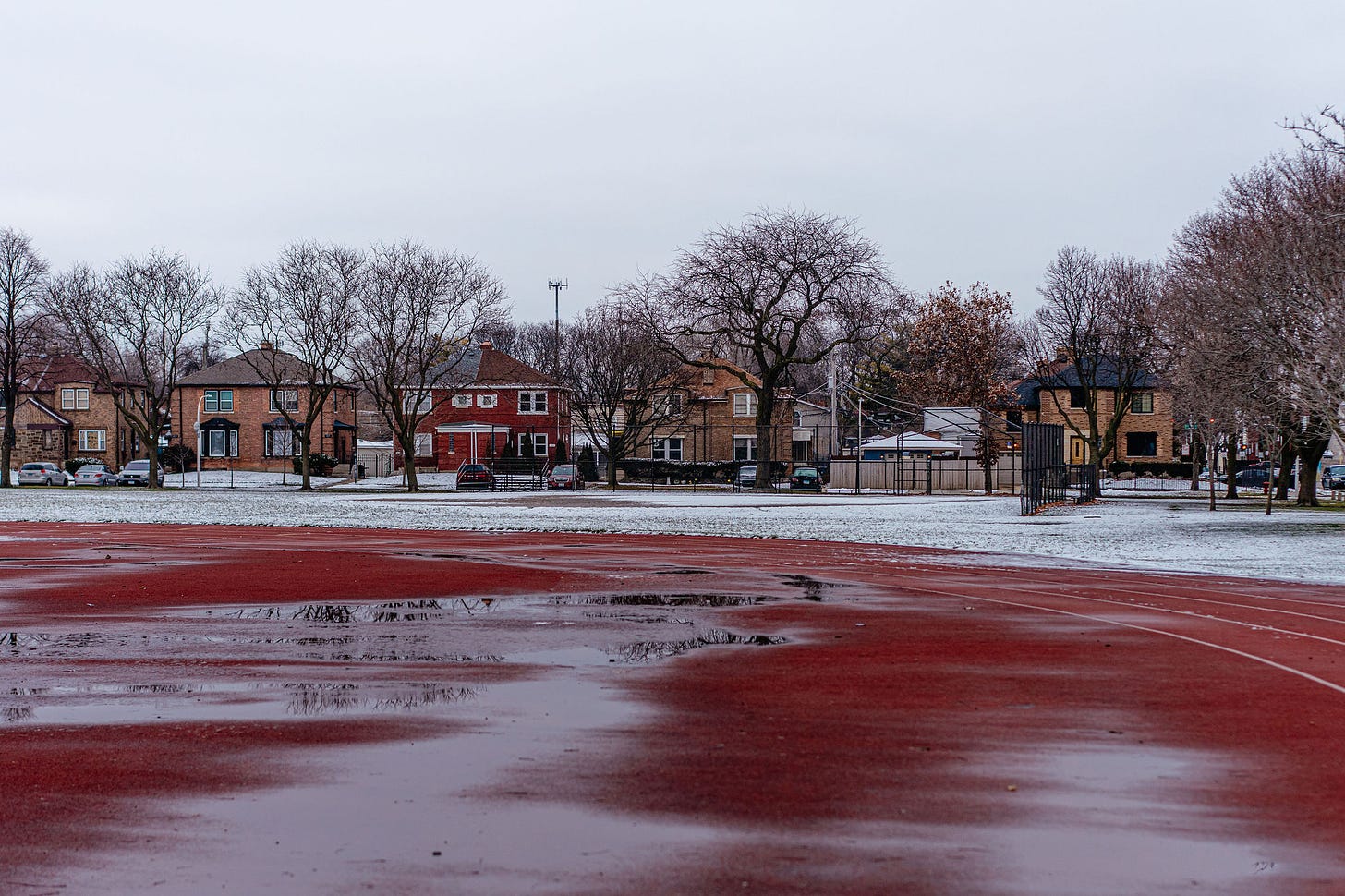
So far, the three minority-led suits confirmed by The Free Press, which challenge the city of Chicago over migrants, have been successful. When asked for comment, a Chicago city spokesperson said there are “no plans” to use Amundsen Park or the former South Shore High School as a shelter.
(Meanwhile, the proposed shelter in Brighton Park, the reason a Hispanic-led coalition was suing the city, was nixed because of “serious environmental concerns.”)
“What we were seeking was exactly what we got,” says Baumann, the pro bono lawyer representing Truss.
On a weekday earlier this month, the senior center at Amundsen Park was alive with the sounds of elders clapping to R&B music that blared through an AM radio. Down the hall, there’s a daycare center filled with dolls, where parents can drop off their kids for $26 an afternoon. As residents rush into the building, the Chicago wind howling behind them, the staff greets nearly everyone by their first names.
Gerald K. Harris, who runs the park’s football program, calls his players “my kids.”
“We’re surrogate fathers,” Harris, 68, says about the kids he coaches, 70 percent of whom live in households run by a single mother.
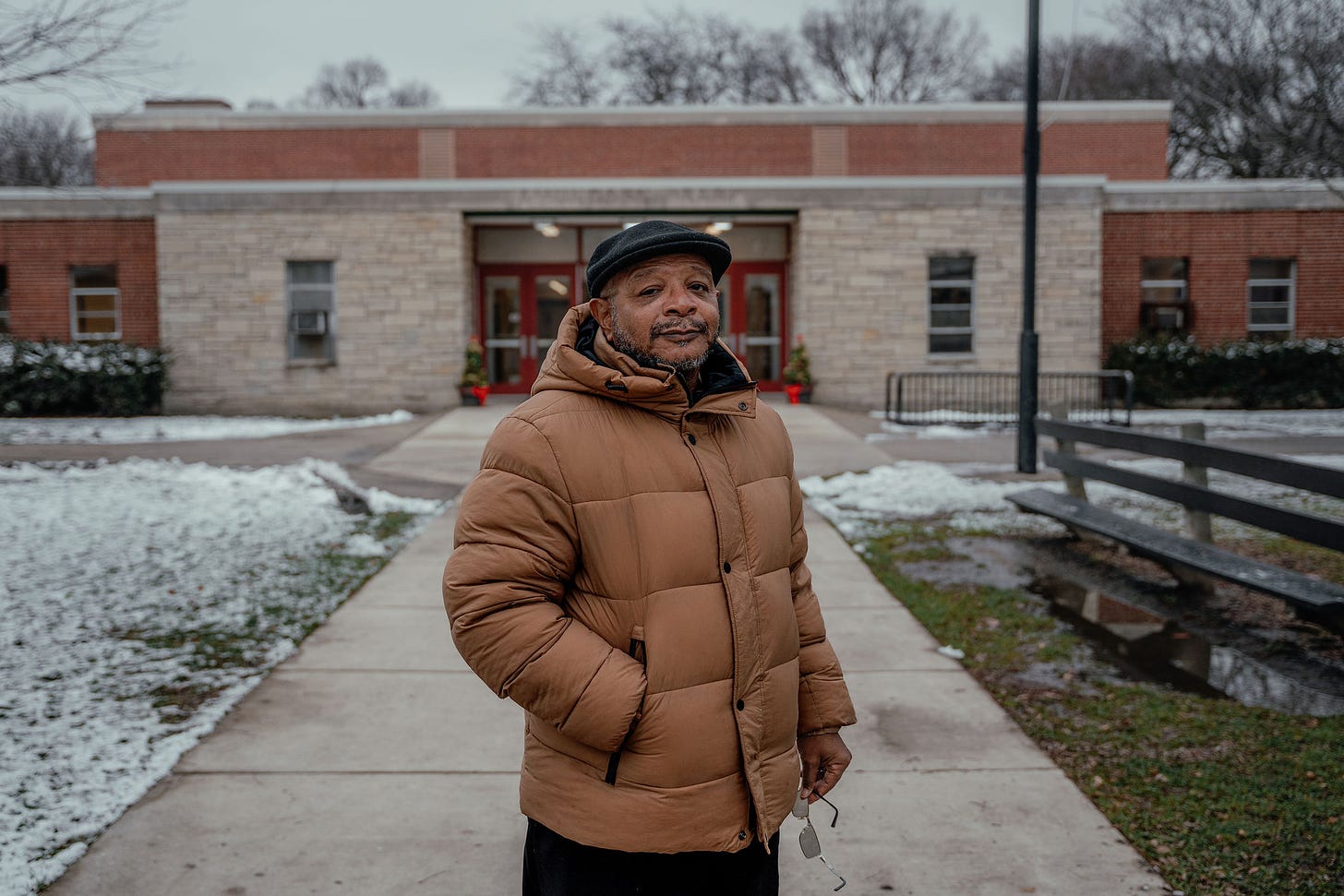
Often, when the building needs something new, Donald Glover, the 73-year-old head of the Amundsen Park Advisory Council, will pay for it. That’s because, he says, the city is often unresponsive to their needs, including when the air conditioning went on the fritz a few summers ago.
“The city of Chicago wasn’t going to do a damn thing,” he tells me.
So in 2020, he and a neighbor went to Home Depot themselves, buying seven new air conditioners—plus a fridge, stove, and microwave. It was a $2,900 tab in a neighborhood where the median household income is $38,000.
Then, this past October, Glover found out that, if the city had its way, all the new appliances he bought would be used by the building’s new tenants—the migrants.
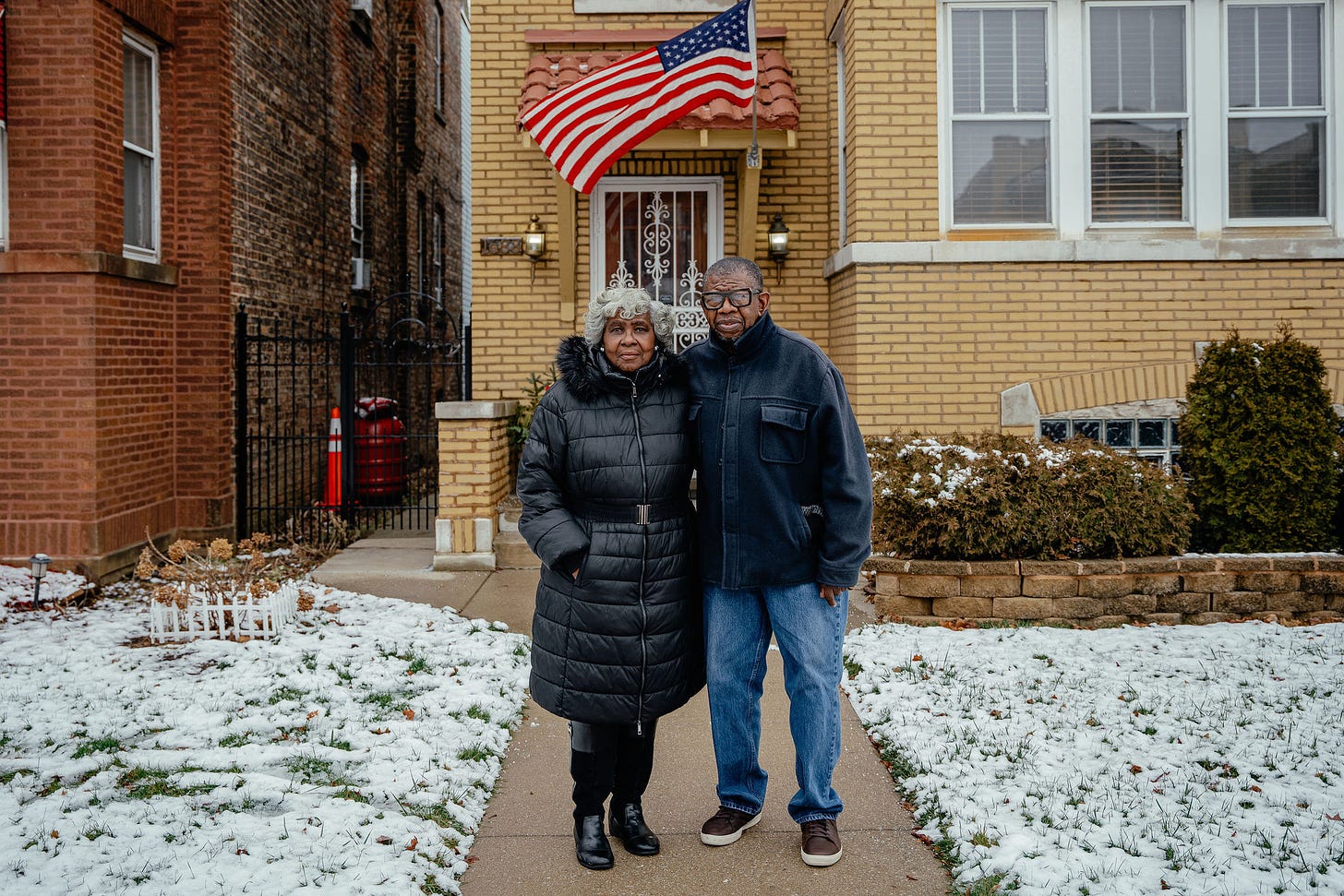
“It was so disrespectful,” says Glover, who’s lived down the block for nearly four decades. “You have homeless people of all colors in Chicago. They don’t give a crap about them. But you can appropriate all this money for migrants? It’s not fair.”
Chicago’s Mayor Johnson, who pledged during his 2023 campaign to “live by the promise to be a sanctuary city,” has blamed Governor Abbott for the problem, saying, “He is attacking Democratically run cities, and particularly cities that are being led by black leaders.”
But Glover, who says he had to work two jobs most of his life, isn’t buying it.
“I’m sick of the same crap,” he says, his brows furrowed beneath his glasses. “This country cannot exist the way it’s going.”
He pauses to gather his breath, then scoots to the front of his chair, as if to issue a warning to the Democrats. “They’re on thin ice.”
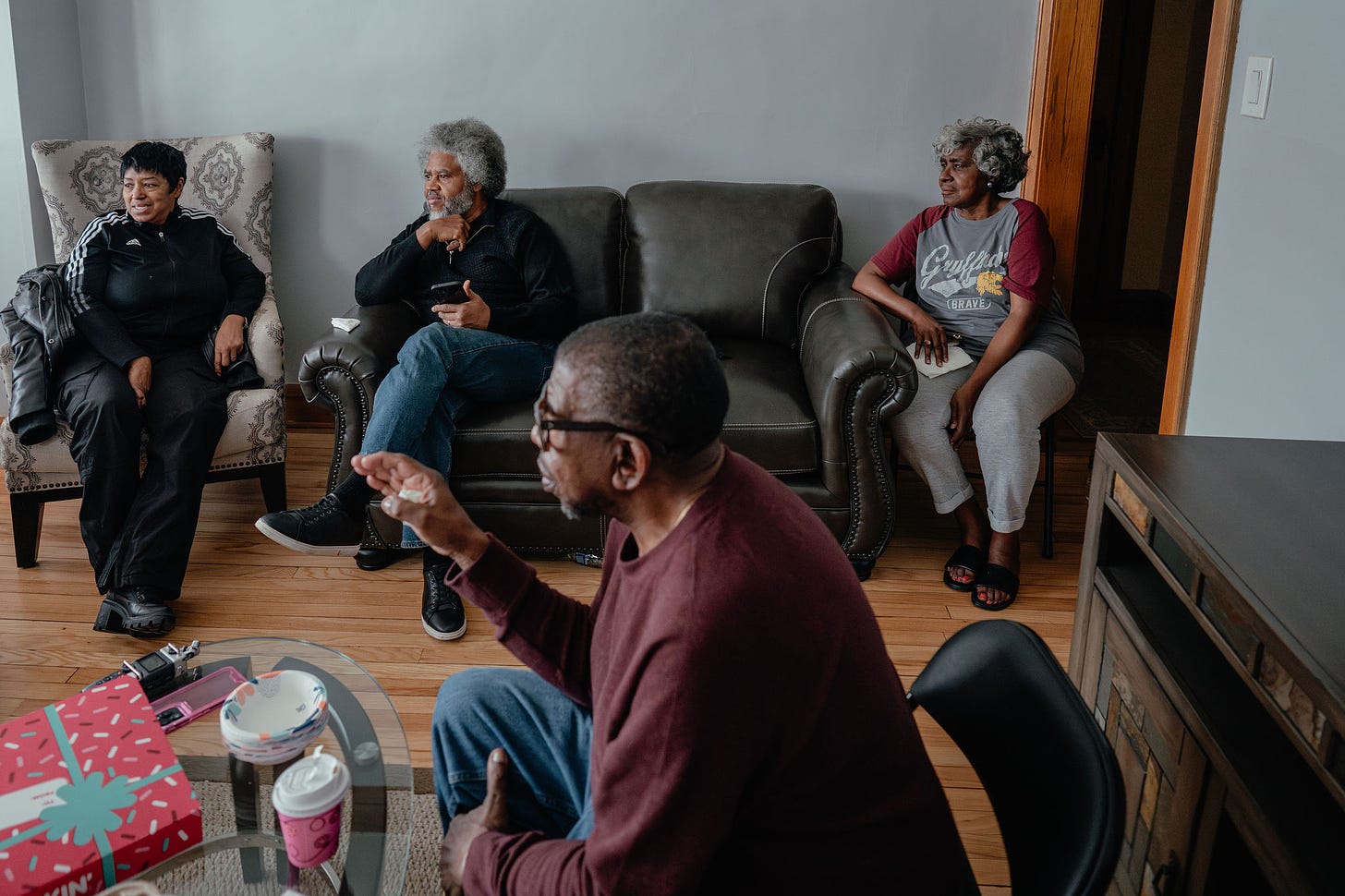
Truss, who led the suit to regain control of the field house, agrees. When she tried to reach Mayor Johnson’s office to complain about the migrant situation, “Not one phone call was returned. No one bothered to sit down and speak with me—and this is a Democratic city.”
She pauses to gather her breath, then says: “So basically, what you’re telling me is that my voice doesn’t matter.”
“It’s unacceptable,” she says about how the Democratic Party treats its black voters.
“We built this country on our backs, and they have left us out here to dry.”
That is why, come November, if it’s a rematch between Biden and Trump, she’ll cast her first vote for a Republican ever. At least Trump took border security seriously, she says.
“The black vote is no longer etched in stone,” she says. “You can’t just assume you’re going to get it if you continue to not serve us.
“We’re not doing that anymore.”
Comments are closed.
